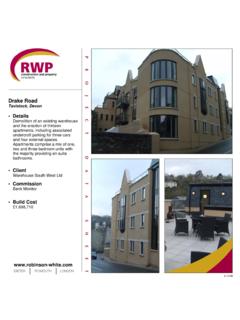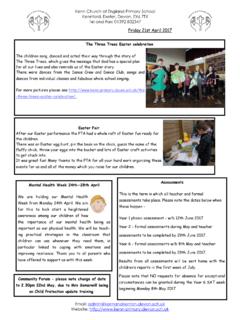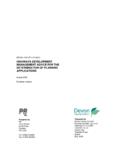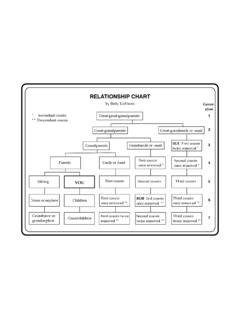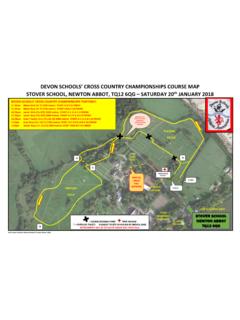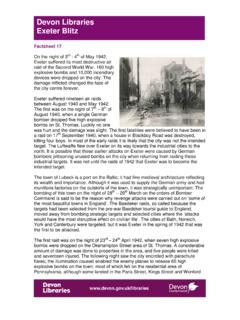Transcription of Local Evidence To The Devon Commission
1 NEW FROMTHE AUBANE HISTORICAL SOCIETYbyBrendan Clifford"SPOTLIGHTSONIRISH HISTORY"A collection of talks at the O'Keeffe Institute,Newmarket, on:The Battles of Knocknanoss and Knockbrack, JohPhilpott Curran, Daniel O'Connell, The Civil WarEdmund Burke, The Famine, "THE CORK FREEPRESS"An account of the All-for-Ireland League in thecontext of the politics between the Parnell split by:The Aubane Historical Society,Aubane,Millstreet, Co. Evidence given to the Devon Commission is one of the most important sources of information for an Irish Historian.
2 It s a pity it has never been republished. The Commission sought to collect information on the land issue and put forward recommendations for its solution in the mid 1840s. It did a good job in col-lecting information and in making proposals. It emphasised the need for patience in solving the issue. The land system was based on the confiscations following the Cromwellian/Williamite wars that put an alien caste on top of the society with no normal human connection with the society as a whole. The relationship was a purely mercenary one of exploitation and there was no shared interest in a common society.
3 It was a problem that patience in itself would never have solved. The Commission realised all this but had to de-scribe the real situation in rather oblique ways. For example, the effect of the Penal Laws on Catholics was that they .. had checked their industry which must have been one of the understatements of the century!The Government of the day did not, in any case, have much patience with societies that stood in its way of building an Empire and it was just then presented with a great opportunity of solving the Irish Problem , , the existence of another and different society, with the appearance of the potato blight.
4 This was seen as God lending the government a big hand especially when the Liberals came to power. The Devon Commis-sion s patient approach was made vast majority of those giving Evidence were landlords agents and landlords themselves and it obviously deals with the issues from their perspective. The main problem being how to get rid of people who were not judged a commercial success as tenants. The descendants of those who had acquired the land originally by war and confiscation saw nothing wrong in giving themselves the moral authority to decide other people s rights to the land by how hard they worked for them and by how much they able to exploit them.
5 This was the natural order of things as far as they were concerned. Resentment against this was considered some sort of perversion rather than being the most natural thing in the Commissioners met in towns throughout the country though not in Millstreet no doubt because of the fact that Millstreet was so much the private property of the Local landlords and had practically no public life. The Commission met in Macroom and Kanturk. The Local Evidence is interesting in that there was a glimpse of the other side s resentment provided by the Evidence of Parish Priest of Millstreet, Fr Patrick FitzPatrick who put the proverbial cat among the pigeons by claiming that there had been an attempt at a Protestant Plantation in the locality by some landlords as part of their of their improvement.
6 The particular interest for Aubane is the description of what happened after the death of Henry Leader of Tullig in 1834, who had not been an improving landlord, which meant he did not go in for evictions. He lived at what is now Cashman s and the family had had a lease there for three generations which expired with his death. There was then a scramble to take over and improve the estate. People who were not pulling their weight in the eyes of the new landlords were sent to the mountains, mainly Mushera.
7 Some were Kel-lehers and this is one of the reasons there were so many Kellehers in the Aubane area. Tenants were invited to come from anywhere and as Protestants were considered by the landlords to be more improving than Catholics they were encouraged to have also attached a poem translated by Sean Sheehan from the Gaelic by a Local poet called O Brien, who was one of those affected by the improvement in Tullig and who ended up in Aubane. O Brien was probably as interested in making poetry as he was in working the land and his neighbours were probably as interested in listening to him.
8 These would have been exactly the type of tenants who needed improve-ment as their poetry would not have helped pay the rent. And it is quite clear from the Evidence that the last thing appreciated by the landlords and their agents was such things a poetry. His poem mentions the people referred in the Evidence who went around valuing and apportioning the land in Tullig after Henry Leader s death. His sentiments give some idea of the bitterness engendered among people by this improvement and how it would have lived on to feed the land war a generation later, the day of reckoning , that he foresees in the last line of his Lane, October TAKEN BEFORE THE COMMISSIONERS APPOINTEDJ eremiah Eugene Macarthy, esq.
9 , sworn and Where is your residence ? My town residence is in the city of Cork, and my country residence Rath-duane, in the barony of West Muskerry. I am a magistrate of the county, and I am also a large middleman. I lease in tho county of Cork over 7,000 acres; and for the last thirty years I hare farmed myself about 3,000 In what district are these lands situate ? About 1,000 acres are partly in the Kinsale and partly in the Cork union, and the remainder in the baronies of Duhallow and West Muskerry, all in the county of Is much of the land in tillage ?
10 I have fifty acres of wheat, and a small portion of barley. It is not my object to go too much into tillage, and I keep it in grazing, but it is all capable of converting to tillage. My father held a great deal of it for twenty years before. He began the world a poor man. He took land in the year 1781 to 1790, when prices were very low, and retained, the land on his hands, improving it, and getting it better. I have been reared to it, and practised it all my life, expending all my income upon the improve-ment of the How do you hold it?

